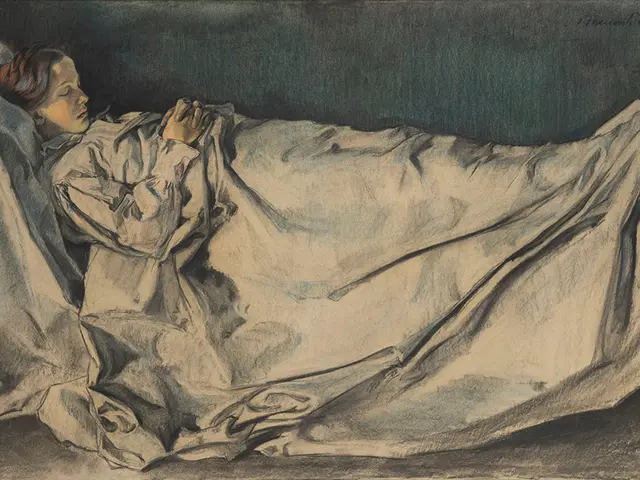EastEnders Characters Grapple with Grief and Bipolar Disorder's Complex Connection in Latest Plotline
EastEnders Spotlight: Navigating Grief and Bipolar Disorder
Soap opera EastEnders stuns with its authentic portrayal of mental health issues, particularly focusing on characters like Stacey Slater and her mother Jean Slater. Both characters grapple with bipolar disorder, showcasing the realities of the condition in a relatable way.
Recently, EastEnders took a stirring turn, exploring how grief intersects with bipolar disorder. Following the passing of Martin, Stacey's narrative delves into her struggle with low mood, decreased activity, and zapped energy. This plot raises vital questions: how do we differentiate natural grief from a bipolar depression? When should we intervene in a loved one's life?
Professor Guy Goodwin, an emeritus professor of psychiatry at the University of Oxford, explains the complexity. "Loss triggers grief, a natural reaction, unique to each person. Distinguishing it from feelings of bipolar depression is important because inaction may exacerbate symptoms, leading to more severe depression and intrusive, recurring thoughts of harming oneself."
Personal stories resonate with this challenge. Ann-Marie Steele, a resident of Manchester, shares her experience. "Grieving feels challenging as I feel numb, hardly cry, and don't know how to act. But grief seems different from full-blown bipolar depression, which has involved months of feelings of helplessness, isolation, and fear."
Bipolar UK, a national charity, emphasizes the frequency of this issue. Over half of their survey participants (55%) reported that bereavement triggered a bipolar episode. Other life events, like redundancy or divorce, also frequently exacerbate the risk of mood instability.
Rebecca Goddard, a resident of Kent, reflects on her journey. "I didn't realize the difference between grief and bipolar depression when I experienced a miscarriage five years ago. But my husband recognized I was very erratic, and crashed. Even now, when I see anything about loss, I still can't comprehend what's happened, and my bipolar depressive episodes still feel linked to this extreme grief."
Simon Kitchen, Bipolar UK's CEO, urges proactive management. "For someone with bipolar, relapse prevention centers on understanding their personal illness patterns and identifying early signs of an episode, enabling them to take action to prevent it. Recording mood daily using a Mood Scale and Mood Tracker app can help individuals identify typical patterns, making it easier to distinguish between natural grief and the symptoms of depression which might require support and medication adjustments from a healthcare team."
Understanding the Complexities of Grief and Bipolar Disorder
The emotional turbulence of both grief and bipolar depressive episodes can be remarkably similar, with feelings like sadness, hopelessness, and loss of interest. However, the context and triggers differ distinctly. Grief is generally tied to specific losses, while bipolar episodes are connected to a recurring pattern of mood swings.
Daily life also suffers in both scenarios, affecting social interactions and well-being. Symptoms of bipolar disorder can be chronic, cycling through periods of mania and then depressive episodes. Grief tends to resolve itself over time, but the recovery process can still be long and challenging.
Similar coping strategies can be beneficial for both conditions, such as leaning on loved ones, seeking therapy, and maintaining routines. However, managing bipolar disorder often requires ongoing professional treatment, including medication and specialized therapy.
Distinguishing Between Grief and Bipolar Depression
- Recognize Context: Grief is typically tied to a particular loss, while bipolar episodes can occur spontaneously.
- Consider Duration and Intensity: Grief is usually less unpredictable, whereas bipolar depression might have no clear timeline and can recur without obvious triggers.
- Observe Behavioral Patterns: Grief often involves rumination about the loss, while bipolar disorder might include episodes of mania characterized by increased energy and poor judgment.
- Assess Response to Support: Grief generally responds well to emotional support and time, while bipolar disorder requires consistent professional treatment and medication adjustments.
Navigating the complexities of grief and bipolar disorder demands understanding the differences between these conditions and implementing appropriate strategies. Seeking professional evaluation, maintaining a routine, educating oneself and others, and utilizing therapy are all essential components of successful management.
- In the realm of health-and-wellness, understanding the complex interplay between grief and mental health, particularly bipolar disorder, is essential.
- Acquiring knowledge about the subtleties between grief and bipolar depression, such as recognizing context, duration, intensity, and behavioral patterns, can help individuals and their loved ones make informed decisions about support and treatment.







